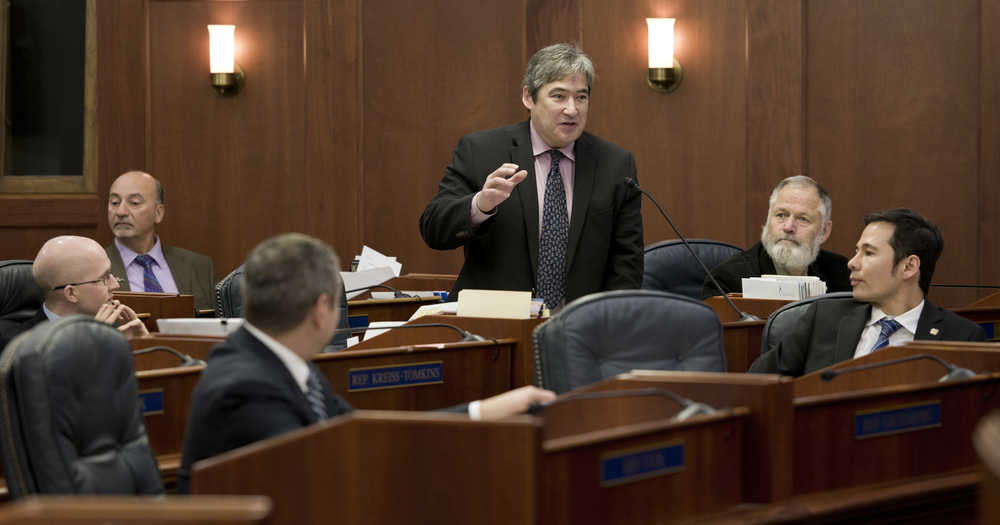Neither construction dust or the shrieking sound of drilling could keep the Alaska Legislature from starting its third special session of 2015 on Saturday.
“You’ve got some competition outside the room right now — can you speak up?” asked Rep. Steve Thompson, R-Fairbanks and co-chairman of the House Finance Committee, when the sound of drilling interrupted the committee’s questions.
The questioned gas pipeline expert did speak up, and the meeting went on.
So went the first day of an extraordinary session devoted to laying down some of the financial groundwork for the state’s long-awaited natural gas pipeline.
The AKLNG project envisions an 800-mile pipeline between the North Slope and Cook Inlet. At the southern end of the $45 billion to $65 effort will be an export terminal intended to send liquefied natural gas (the LNG in AKLNG) to destinations around the world.
Before that can happen, the state needs to figure out how to pay for its 25 percent share of the project.
To date, it has relied on Canadian pipeline builder TransCanada to pay the upfront costs. With TransCanada charging 7.1 percent interest on every state expense, lawmakers are taking a second look at that arrangement.
“We actually turned TransCanada into a highly technically-oriented bank,” said Rep. Sam Kito III, D-Juneau and one of the interested observers at a briefing that began at 8 a.m. in Centennial Hall.
With about half of the Legislature in attendance, state-contracted analysts explained the pros and cons (mostly the pros) of buying out TransCanada’s contract and seeking alternative sources of funding.
If the state buys out TransCanada it would earn almost $400 million more per year once the pipeline begins operating, something expected in the mid-2020s. Given a 30-year pipeline lifecycle, the state would earn an additional $12 billion.
On the flip side, the buyout would “require the state to finance an additional approximately $7 billion,” explained Rep. Cathy Muñoz, R-Juneau and a member of the House Finance Committee.
Were it a simple math problem, the answer would be easy. The Legislature must also consider how the state will pay for the extra expenses if TransCanada steps down. Natural gas sales are decades away in the best circumstances, and the state is facing a multibillion-dollar gap between revenue and expenses that makes it impractical to expect annual budgets to provide for a long-term payoff.
The alternatives include seeking loans on the open market, which could affect the state’s credit rating and thus the interest it pays on loans for things like schools and ports.
The state could also ask the Alaska Permanent Fund to invest in the project, though incoming fund director Angela Rodell said in previous interviews that such an arrangement would have to be as profitable for the fund as its other investments are. The state wouldn’t get special treatment.
The state must make this decision now because Dec. 31 is the deadline for the first stage of the project’s development. If Alaska doesn’t end its relationship with TransCanada before the end of the year, it will be locked in for the second phase, estimated to cost about $675 million. TransCanada’s interest charges will correspondingly rise.
Saturday’s 8 a.m. briefing was organized by the office of Gov. Bill Walker, who supports the buyout idea. A series of state officials and paid analysts made the case for the buyout but didn’t take questions from lawmakers.
After the briefing, lawmakers traveled to the Capitol, where the House and Senate formally gaveled into session shortly after 11 a.m.
As the House exited its chamber, Muñoz carried a fat white binder packed with pages, apparently of research into the TransCanada deal.
“There’s a lot of material that needs to be absorbed and considered before I draw any conclusions on it,” she said.
She and the rest of the House Finance Committee have scheduled a week of meetings to interrogate the state’s contracted advisers about the accuracy of their work, and then the Senate is expected to have its turn.
The latter body held no hearings on Saturday, as Gov. Walker unexpectedly canceled his proposal for a natural gas tax on Friday, one day before the session’s start.
The House Finance Committee’s work on the first day included a two-hour grilling of two state analysts hired to examine the financial implications of a buyout. The House will hold its next finance committee meeting at 3 p.m. today.
Sen. Dennis Egan, D-Juneau, isn’t a member of the Senate’s finance committee, but he said he’ll be following events just like everyone else will be.
The noise and dust of construction are a side effect of a multi-year process to reinforce the Capitol against earthquakes, something intended to be done during the interim between legislative sessions.
This year’s profusion of special sessions threw that plan into the trash. Nevertheless, Egan said, “With all the construction going on, we can still function in this building.”

